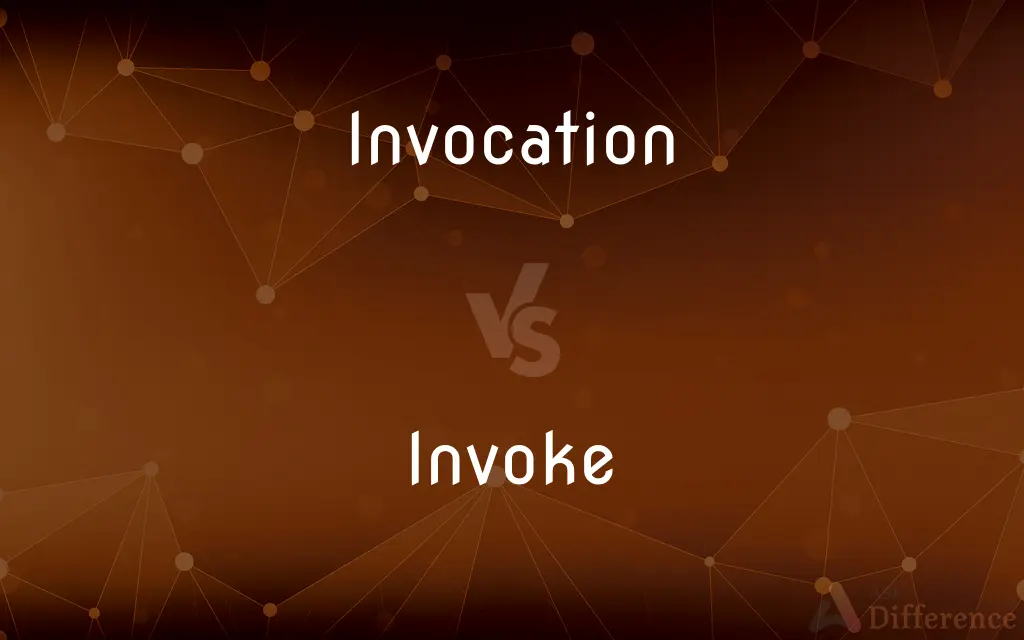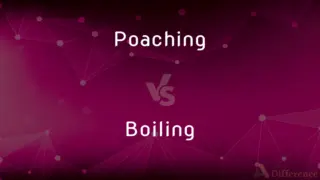Invocation vs. Invoke — What's the Difference?
By Fiza Rafique & Maham Liaqat — Updated on April 3, 2024
Invocation is a noun describing the act of calling upon something, especially aid or authority. Invoke is the verb form, meaning to call on something, like a rule or deity, for help.

Difference Between Invocation and Invoke
Table of Contents
ADVERTISEMENT
Key Differences
Invocation refers to the act of summoning or calling upon a higher power, authority, or force, often through a formal or ceremonial request. It's commonly used in religious, spiritual, and legal contexts, signifying the process of making an appeal or request for assistance. Whereas invoke is the action of performing this summoning or calling upon. When one invokes, they actively engage in the process of calling upon a rule, law, deity, or spirit, often to justify an action, request aid, or provoke a desired outcome.
Invocation is a term steeped in ritual and ceremony, suggesting a formal or structured approach to seeking assistance or guidance from a higher power or authority. It implies a degree of solemnity and purpose, often associated with prayer, ceremonies, or legal procedures. On the other hand, to invoke can be seen as the practical application of this act, where one might invoke a deity's name in prayer, a principle in an argument, or a legal precedent in court to support a case.
The term invocation often carries a connotation of spirituality or mysticism, being closely linked to practices that involve a direct appeal to supernatural forces or beings. It reflects a moment or act of communication with a realm beyond the immediate, tangible world. Conversely, invoke, while it can also pertain to spiritual acts, is used more broadly to refer to the act of calling upon any source of authority or power, whether it be invoking a deity's protection or invoking a law to argue a legal point.
Invocation usually implies a one-way communication, directed from the invocator towards the entity being called upon, with the expectation of some form of assistance or intercession. It is an act that acknowledges a higher power or authority. Meanwhile, to invoke is to take a more active stance, utilizing the authority, rule, or spirit being called upon as a means to an end, whether it be for protection, justification, or guidance.
In the context of programming or technology, invocation can refer to the act of initiating or activating a function, method, or procedure within a program. This usage underscores the term's versatility, extending its meaning into the realm of action and process initiation. Invoke, in this technical context, aligns closely with its general usage, denoting the act of calling a function or procedure into action, emphasizing the dynamic and operational aspect of the term.
ADVERTISEMENT
Comparison Chart
Part of Speech
Noun
Verb
Context
Often used in religious, spiritual, legal contexts
Broad usage, including religious, legal, technical
Connotation
Formal, ceremonial
Active engagement, application
Communication
One-way, expecting assistance
Active, utilizing authority or power
Technical Usage
Refers to the act of initiating a function
Act of calling a function into action
Compare with Definitions
Invocation
An introductory part of a poem or speech.
The poet's invocation of the muse was meant to inspire creativity.
Invoke
To cause to be invoked; result in specific operations in computing.
This command invokes the program's help system.
Invocation
A formal request for help or guidance from a deity or the supernatural.
The priest's invocation sought divine protection for the villagers.
Invoke
To appeal to someone as an authority for support or justification.
She invoked the constitution to defend her argument.
Invocation
The process of starting a computer program or routine.
Successful invocation of the software requires proper credentials.
Invoke
To put into effect or operation (a law, rule, etc.).
The mayor invoked a curfew to ensure public safety.
Invocation
A call to a deity or spirit in prayer or magic.
The shaman's invocation aimed to heal the sick child.
Invoke
To call on (a higher power or authority) for assistance, support, or inspiration.
He invoked his ancestor's spirit for courage.
Invocation
The act of invoking something, especially a law or rule.
Her invocation of the Fifth Amendment protected her from self-incrimination.
Invoke
To call for earnestly; solicit.
The activist invoked public support for the cause.
Invocation
An invocation (from the Latin verb invocare "to call on, invoke, to give") may take the form of: Supplication, prayer or spell. A form of possession.
Invoke
To call on (a higher power) for assistance, support, or inspiration
"Stretching out her hands she had the air of a Greek woman who invoked a deity" (Ford Madox Ford).
Invocation
The act or an instance of invoking, especially an appeal to a higher power for assistance.
Invoke
To appeal to or cite in support or justification.
Invocation
A prayer or other formula used in invoking, as at the opening of a religious service.
Invoke
To call for earnestly; solicit
Invoked the help of a passing motorist.
Invocation
The act of conjuring up a spirit by incantation.
Invoke
To summon with incantations; conjure.
Invocation
An incantation used in conjuring.
Invoke
To resort to; use or apply
"Shamelessly, he invokes coincidence to achieve ironic effect" (Newsweek).
Invocation
The act or form of calling for the assistance or presence of some superior being, especially prayer offered to a divine being.
Invoke
(Computers) To activate or start (a program, for example).
Invocation
A call or summons, especially a judicial call, demand, or order.
The invocation of papers or evidence into court
Invoke
(transitive) To call upon (a person, a god) for help, assistance or guidance.
Invocation
(law) An act of invoking or claiming a legal right.
Invoke
(transitive) To solicit, petition for, appeal to a favorable attitude.
The envoy invoked the King of Kings's magnanimity to reduce his province's tribute after another drought.
Invocation
(programming) The act of invoking, such as a function call.
Invoke
(transitive) To call to mind (something) for some purpose.
Invocation
The act or form of calling for the assistance or presence of some superior being; earnest and solemn entreaty; esp., prayer offered to a divine being.
Sweet invocation of a child; most pretty and pathetical!
The whole poem is a prayer to Fortune, and the invocation is divided between the two deities.
Invoke
(transitive) To appeal for validation to a (notably cited) authority.
In certain Christian circles, invoking the Bible constitutes irrefutable proof.
Invocation
A call or summons; especially, a judicial call, demand, or order; as, the invocation of papers or evidence into court.
Invoke
(transitive) To conjure up with incantations.
This satanist ritual invokes Beelzebub.
Invocation
A prayer asking God's help as part of a religious service
Invoke
(transitive) To bring about as an inevitable consequence.
Blasphemy is taboo as it may invoke divine wrath.
Invocation
An incantation used in conjuring or summoning a devil
Invoke
To cause (a program or subroutine) to execute.
Interactive programs let the users enter choices and invoke the corresponding routines.
Invocation
Calling up a spirit or devil
Invoke
To call on for aid or protection; to invite earnestly or solemnly; to summon; to address in prayer; to solicit or demand by invocation; to implore; as, to invoke the Supreme Being, or to invoke His and blessing.
Go, my dread lord, to your great grandsire's tomb, . . . Invoke his warlike spirit.
Invocation
The act of appealing for help
Invoke
Evoke or call forth, with or as if by magic;
Raise the specter of unemployment
He conjured wild birds in the air
Stir a disturbance
Call down the spirits from the mountain
Invoke
Cite as an authority; resort to;
He invoked the law that would save him
I appealed to the law of 1900
She invoked an ancient law
Invoke
Request earnestly (something from somebody); ask for aid or protection;
Appeal to somebody for help
Invoke God in times of trouble
Common Curiosities
Can invoke be used in non-religious contexts?
Yes, invoke can be used in various contexts, including legal, technical, and everyday situations, to refer to the act of calling upon a rule, law, or procedure.
Is invocation only related to prayer or religion?
While often used in religious or spiritual contexts, invocation can also refer to the act of calling upon any authority or power, including legal precedents or principles.
Can both terms be used interchangeably?
No, because invocation is a noun and invoke is a verb, their usage depends on the grammatical context. Invocation refers to the act or process, while invoke describes the action of performing that process.
How does invocation function in programming?
In programming, invocation refers to the process of initiating or executing a function, method, or procedure within a program.
What is the difference between invocation and invoke?
Invocation is a noun referring to the act of calling upon a higher power or authority, while invoke is a verb meaning to actively call upon something or someone for help.
Can invocation have a psychological effect?
Yes, the act of invocation, especially in religious or spiritual contexts, can have a significant psychological effect, providing comfort, inspiration, or a sense of empowerment.
What role does invocation play in rituals?
In rituals, invocation is a crucial element, often serving to call upon spiritual entities or forces to participate or bless the proceedings.
What does it mean to invoke someone's name?
To invoke someone's name means to call on their authority or reputation to support an argument or action.
What is an example of invoking a law?
Invoking a law can involve citing a specific statute or legal principle in court to support a legal argument or defense.
How is invocation used in legal contexts?
In legal contexts, invocation can refer to the act of calling upon a specific law, right, or privilege as part of a legal argument or defense.
How does the concept of invocation vary across cultures?
The concept of invocation varies widely, with different traditions and cultures having their own practices and beliefs about how and whom to call upon.
Is it possible to invoke something without speaking?
Yes, in both religious/spiritual practices and in technical contexts, invocation can occur through actions, rituals, or programming commands, not just spoken words.
What is the significance of invocation in poetry?
In poetry, an invocation can serve as a prologue, calling upon the muses or other entities for inspiration and guidance in the creative process.
Share Your Discovery

Previous Comparison
Shawn vs. Shaun
Next Comparison
Poaching vs. BoilingAuthor Spotlight
Written by
Fiza RafiqueFiza Rafique is a skilled content writer at AskDifference.com, where she meticulously refines and enhances written pieces. Drawing from her vast editorial expertise, Fiza ensures clarity, accuracy, and precision in every article. Passionate about language, she continually seeks to elevate the quality of content for readers worldwide.
Co-written by
Maham Liaqat













































